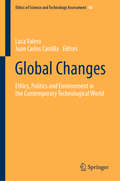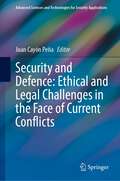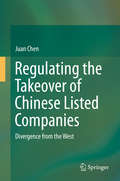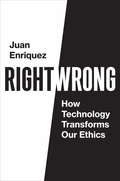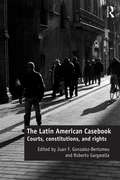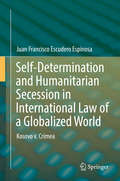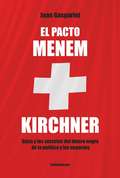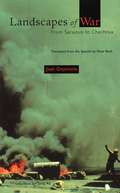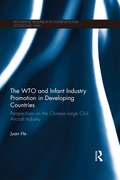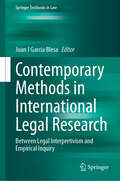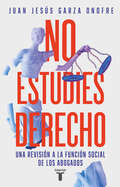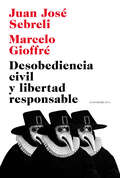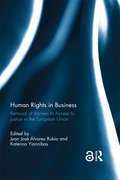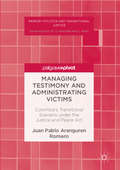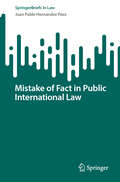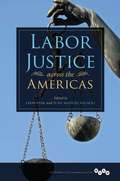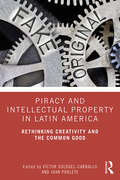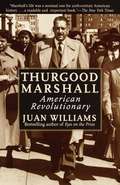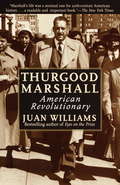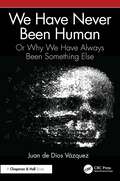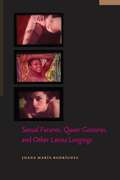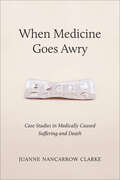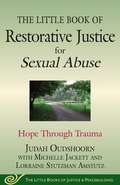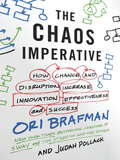- Table View
- List View
Global Changes: Ethics, Politics and Environment in the Contemporary Technological World (Ethics of Science and Technology Assessment #46)
by Luca Valera Juan Carlos CastillaThis book offers an authoritative analysis of the challenges that have arisen as a result of modern technologies. It covers several environmental problems, such as climate change, overexploitation of natural resources, loss of natural habitats, pollution and human population growth, and discusses practical scenarios for sustainable human dwelling of our planet. Adopting an interdisciplinary approach, the first part introduces “global changes”, describing how they are happening in reality, and the challenges arising from them. The second part introduces methodological approaches borrowed from various disciplines, such as engineering, management science, philosophy and theology, which can help deal with the contemporary challenges resulting from global changes. Lastly, the third part discusses some of the themes presented in the light of novel concepts, such as the Anthropocene, and includes interesting proposals and ideas about how human beings could dwell the Earth in this new age. Offering a comprehensive theoretical reflection on the relation between technology, environment and human beings, it also provides a practice-oriented guide for researchers and decision-makers working on a new ethical paradigm of acting in the Anthropocene.
Security and Defence: Ethical and Legal Challenges in the Face of Current Conflicts (Advanced Sciences and Technologies for Security Applications)
by Juan Cayón PeñaThis book aspires to face the challenge of analyzing with due academic rigor, always in the paradigm of security and advanced sciences, but without forgetting the ethical questions that our world raises every day. The work is divided into two main sections: the first section is focused on the cyber world, with not only technical but also legal derivations given the expansion of vulnerabilities and our technological dependence. The second section, with a more interdisciplinary nature, runs through undeniably topical issues such as territorial problems and the potential decline of the traditional States, the communicational impact of information management and false news, or the commitment to essential freedoms for the West. This book connects advanced technologies and ethical issues and includes discussions on recent crises such as COVID-19. It also provides an interdisciplinary view on the ethical issues for security technologies.
Regulating the Takeover of Chinese Listed Companies
by Juan ChenThis book provides a comprehensive review of the Measures for Administration of Takeover of Chinese Listed Companies (the Chinese takeover law), with emphasis on the differences between the Chinese takeover law and takeover legislation in the UK, the US and Hong Kong. The Chinese M&A market has been booming at an unprecedented rate in recent years; not only domestic investors, but also foreign funds and multinational companies are actively participating on the market. For both market participants and researchers, it is crucial to understand the emerging and transitional aspects of the Chinese economy and its M&A market, and the impacts of those aspects on relevant laws. While there are ongoing academic discussions on the convergence between the Chinese takeover law and its counterparts in the UK, Hong Kong and the US, this book offers a comprehensive discussion of the divergence and focuses on key differences in the transplanted Chinese takeover law.
Right/Wrong: How Technology Transforms Our Ethics
by Juan EnriquezFrom the TED stage to the page, Juan Enriquez, author of As the Future Catches You and Evolving Ourselves, presents a lively and engaging guide to ethics in a technological age.Most people have a strong sense of right and wrong, and many of us are not reluctant to argue with someone who disagrees. But when we take an unyielding stand on something we regard as an eternal truth, we forget that ethics evolve over time. What was once broadly acceptable is now completely unacceptable. For example, burning heretics is no longer considered a just punishment. Child marriage is not applauded as a family value. Many shifts in the right vs. wrong pendulum are affected by advances in technology. In Right/Wrong, Juan Enriquez reflects on the evolution of ethics in a technological age.
Transitional Justice after German Reunification
by Juan EspindolaHow do societies transitioning from oppressive to democratic rule hold accountable those citizens who contributed to maintaining injustice in the ancient regime by secretly denouncing fellow citizens? Is their public identification a way of fulfilling respect for those who suffered harm as a result of their collaboration? And is public identification respectful of denunciators themselves? This book pursues these questions through a multidisciplinary investigation focusing on the denunciators for the East German secret police and the Ministry of State Security and the way in which they have been publicly unveiled in contemporary German society. The book evaluates the justifications that social actors offer to support or oppose public identifications; how targeted collaborators react to this social practice; and whether it achieves its intended purpose. At every stage, the book asks whether the motivations and the consequences of public identifications honor or undermine the value of respect for people.
The Latin American Casebook: Courts, Constitutions, and Rights
by Roberto Gargarella Juan F. Gonzalez-BertomeuTraditionally relegated because of political pressure and public expectations, courts in Latin America are increasingly asserting a stronger role in public and political discussions. This casebook takes account of this phenomenon, by offering a rigorous and up-to-date discussion of constitutional adjudication in Latin America in recent decades. Bringing to the forefront the development of constitutional law by Latin American courts in various subject matters, the volume aims to highlight a host of creative arguments and solutions that judges in the region have offered. The authors review and discuss innovative case law in light of the countries’ social, political and legal context. Each chapter is devoted to a discussion of a particular area of judicial review, from freedom of expression to social and economic rights, from the internalization of human rights law to judicial checks on the economy, from gender and reproductive rights to transitional justice. The book thus provides a very useful tool to scholars, students and litigants alike.
Self-Determination and Humanitarian Secession in International Law of a Globalized World: Kosovo V. Crimea
by Juan Francisco Escudero EspinosaThis book addresses questions in connection with the international legal regime on demands for secession, which have arisen in various States. More specifically, it examines the unilateral declarations of independence by Kosovo in 2008, and by Crimea and its subsequent annexation by the Russian Federation in 2014. The work investigates the two cases so as to shed light on the international legal regime affecting entities that are smaller than a sovereign State. It analyzes the relevant principles of international law, the intention being to determine their scope and review them in light of the most recent practice and developments in international law. In turn, the book examines and explains the events of relevance for international law that occurred in the changing situations in Kosovo and Crimea. On the basis of these legal considerations, it explores how the international community can respond when faced with situations that may violate international law, together with the effectiveness of various measures. It also discusses whether certain situations might be legitimate as a concept could now be emerging that secession may be justified in specific circumstances, such as serious and widespread violations of basic human rights.
El pacto Menen- Kirchner: Suiza y los secretos del dinero negro de la política y los negocios
by Juan GaspariniEl pacto suizo de no agresión entre Carlos Saúl Menem y Néstor Kirchnerflorece en este libro impecablemente documentado, en el que se revela lamatriz helvética de las coimas y una red de corrupción internacional. ¿En qué se parecen escándalos como los de Thales, Skanska, Siemens,Alstom y el tren bala, la cuenta suiza de Menem, el Valijagate o losfondos de Santa Cruz? ¿Existe un patrón de comportamiento entreempresas, actores políticos y del ámbito judicial? ¿Son, todos ellos,piezas de un sistema coercitivo que hacen a la impunidad argentina enestos veinticinco años de democracia?Más allá de mutuas críticas ideológicas y de supuestos odios políticos,ambos ex presidentes han decidido, al menos con los dineros suizos, nopasar a mayores, evitar la confrontación.Por encima de convenciones internacionales, de reglamentos y de órganosde control, las firmas trasnacionales no han abandonado la estrategia desobornar para competir en los mercados. Esta investigación periodísticamuestra cómo funcionan, dentro y fuera del país, las grandes coimas, ydesnuda un hecho que, aun estando al alcance de la mano, la justiciaprefiere ignorar: la red de la corrupción internacional y suscomplicidades vernáculas no solo no se ha alterado, sino que se hanfortalecido en las últimas décadas.
Landscapes of War: From Sarajevo to Chechnya
by Juan Goytisolo Peter BushAn incisive examination of the tensions that exist between the West and Islamic societies of Europe, North Africa, and the Middle East. Provides rich historical analysis and reportage of life in four explosive war-zones: Sarajevo, Algeria, the West Bank and Gaza, and Chechnya. Translated by Peter Bush.
The WTO and Infant Industry Promotion in Developing Countries: Perspectives on the Chinese Large Civil Aircraft (Routledge Research in International Economic Law)
by Juan HeThe charter of the World Trade Organization (WTO) sets the tone that sustainable trade and economic development dominates multilateral trade negotiation and specific working agreements. This book examines the novel challenge for developing countries to upgrade and optimize their industrial structure and trade composition by stimulating genuinely innovative and competitive industrial strength. The book specifically explores the issue of infant industry promotion under the legal framework of the WTO treaties and case law. Taking the regulatory measures and incentives China has used to build up a large civil aircraft supplier, the book evaluates the key trade agreements relevant to infant industry promotional policies and practices, such as product regulations and standards under the 'Agreement on Technical Barriers to Trade', and export promotion policies under the 'Agreement on Subsidies and Countervailing Measures'. Juan He argues that the regulatory room prescribed by the multilateral trade rules of the WTO does not allow adequate space for developing countries to encourage new and technologically advanced areas of production and trade. The author concludes by suggesting ways in which WTO rules could be modified to help enable developing countries’ industrialization. In doing so, the book highlights a need to investigate how localized and international policy trends can be reconciled and enhanced towards the common goal of development. The book will be of great interest to scholars and students of international trade law, Chinese studies, international political economy, and of great use to government agencies responsible for internal trade and industrial policy decisions.
Contemporary Methods in International Legal Research: Between Legal Interpretivism and Empirical Inquiry (Springer Textbooks in Law)
by Juan J Garcia BlesaThis book is a concise practical guide to some of the most relevant ways of thinking and doing international legal research today. It is designed to help students and early career researchers to get acquainted with the theory and practice of a selection of non-doctrinal modes of legal research that include feminist international law, critical international law and TWAIL, complemented with qualitative methods of empirical legal research. The book also encourages a meaningful dialogue with traditional doctrinal styles of legal research. The book’s most innovative aspect is its practical, learner-centred approach, which focuses on the applied learning of the modes of research presented.
No estudies derecho
by Juan Jesús Garza OnofreUna invitación a no estudiar derecho el Derecho, para cambiar nuestra relación con las leyes que nos rigen y sus operadores. ¿Desde hace cuánto tiempo se dirá, a modo de chiste, que los abogados y los plátanos se parecen en que no hay uno derecho? ¿Por qué en México, a pesar de que se abre una nueva escuela de Derecho cada semana —¡hay más facultades de Derecho en Puebla que en todo Canadá!—, no vivimos en una cultura de la legalidad? ¿Por qué pareceque es necesario disfrazarse para ejercer la profesión o hablar en un idioma tan extraño que tiene su propio nombre: el abogañol? Algo anda mal con la formación y el papel que desempeñan los abogados en la sociedad. Quienes deberían fungir como garantes del Estado de Derechoe igualadores de los ciudadanos ante el sistema de justicia, muchas veces terminan como guardianes del statu quo y defensores de los intereses de unos cuantos. Por ello, la primera parte de este libro revisa con mirada crítica los principales vicios y obstáculos que afectan la labor de los abogados: desde el conservadurismo dentro del gremio hasta la dificultad para adaptarse a los cambios tecnológicos, pasando por el machismo y la uniformidad aplastante.Por supuesto, este libro no defiende la idea de un mundo sin abogados. De lo que se trata, nos dice Juan Jesús Garza Onofre, es de estudiar y practicar el Derecho de una forma distinta, con creatividad, empatía y tolerancia. Así, la segunda parte de No estudies Derecho ofrece múltiples salidas al atolladero descrito en la primera, para poder contar con mejores abogados y abogadas, libres de estereotipos anquilosados, y que ayuden a construir sociedades más justas.
Desobediencia civil y libertad responsable
by Juan José Sebreli Marcelo GioffréReflexión erudita, testimonio urgente y alegato políticamente poderoso de Sebreli que, al cumplir noventa años, en plena pandemia del Covid-19, habiéndose contagiado y recuperado, rescata el concepto clásico de desobediencia civil y lo propone como modo de resistencia responsable a los atropellos a la libertad y de defensa de la democracia. 28 de mayo de 2020: en el marco de una entrevista televisiva, Juan José Sebreli introduce la idea de desobediencia civil, concepto clásico de la filosofía política del siglo XIX, como posible respuesta a la cuarentena impuesta por el gobierno de cara a la pandemia del Covid-19. En la serie de reacciones heterogéneas que desencadenó esa mención debe buscarse el origen de estas páginas. La falsa antinomia entre salud y economía es solo una de las muchas formas en que se enmascara una creciente vocación autoritaria que es necesario enfrentar. Este libro postula una tesis tan audaz como indispensable: que el atropello a las libertades individuales habilita a los ciudadanos a un tipo de resistencia a la ley que, ejercida de modo responsable, público y no violento, lejos de debilitar las instituciones las enriquece y estabiliza. Ensayo filosófica e historiográficamente erudito, testimonio reflexivo y urgente, y alegato necesariamente político -por esas razones poderoso y valiente artefacto en defensa de la democracia-, Desobediencia civil y libertad responsable se publica en ocasión del nonagésimo cumpleaños de Sebreli.
Human Rights in Business: Removal of Barriers to Access to Justice in the European Union
by Katerina Yiannibas Juan José Álvarez RubioThe capacity to abuse, or in general affect the enjoyment of human, labour and environmental rights has risen with the increased social and economic power that multinational companies wield in the global economy. At the same time, it appears that it is difficult to regulate the activities of multinational companies in such a way that they conform to international human, labour and environmental rights standards. This has partially to do with the organization of companies into groups of separate legal persons, incorporated in different states, as well as with the complexity of the corporate supply chain. Absent a business and human rights treaty, a more coherent legal and policy approach is required. Faced with the challenge of how to effectively access the right to remedy in the European Union for human rights abuses committed by EU companies in non-EU states, a diverse research consortium of academic and legal institutions was formed. The consortium, coordinated by the Globernance Institute for Democratic Governance, became the recipient of a 2013 Civil Justice Action Grant from the European Commission Directorate General for Justice. A mandate was thus issued for research, training and dissemination so as to bring visibility to the challenge posed and moreover, to provide some solutions for the removal of barriers to judicial and non-judicial remedy for victims of business-related human rights abuses in non-EU states. The project commenced in September 2014 and over the course of two years the consortium conducted research along four specific lines in parallel with various training sessions across EU Member States. The research conducted focused primarily on judicial remedies, both jurisdictional barriers and applicable law barriers; non-judicial remedies, both to company-based grievance. The results of this research endeavour make up the content of this report whose aim is to provide a scholarly foundation for policy proposals by identifying specific challenges relevant to access to justice in the European Union and to provide recommendations on how to remove legal and practical barriers so as to provide access to remedy for victims of business-related human rights abuses in non-EU states.
Managing Testimony and Administrating Victims
by Juan Pablo Aranguren RomeroThis book analyzes the implementation of Law 975 in Colombia, known as the Justice and Peace Law, and proposes a critical view of the transitional scenario in Colombia from 2005 onwards. The author analyzes three aspects of the law: 1) The process of negotiation with paramilitary groups; 2) The constitution of the Group Memoria Histórica (Historic Memory) in Colombia and 3) The process of a 2007 law that was finally not passed. The book contains interviews with key actors in the justice and peace process in Colombia. The author analyses the contradictions, tensions, ambiguities and paradoxes that define the practices of such actors. This book highlights that a critical view of this kind of transitional scenario is indispensable to determine steps towards a just and peaceful society.
Mistake of Fact in Public International Law (SpringerBriefs in Law)
by Juan Pablo Hernández PáezThis book offers an in-depth analysis of the problem of mistakes of fact in connection with the law of state responsibility – mistakes which have significant implications for global governance and legal certainty that have yet to be fully mapped out in contemporary international law. The book begins by defining the underlying problem: the abundance of cases in which states have unintentionally violated international law and the law of state responsibility’s apparent silence regarding the juridical consequences of such errors. In turn, it addresses three key areas of state responsibility. First, it explores how mistakes of fact can influence the analysis of attribution in international practice. Second, it addresses the implications of mistakes of fact in identifying “breaches” of international law. This includes a range of case studies, such as state responsibility for accidentally shooting down civilian aircraft or for the accidental killing of civilians on the part of state agents. Thirdly, the book delves into how mistakes of fact can preclude responsibility for established breaches of international law, either on their own or within the matrix of existing defenses. This book is primarily intended for researchers focusing on the international law of state responsibility. Its aim is to spark a discussion about how to address important aspects of state practice that existing instruments do not exhaustively codify. As it seeks to provide clarity on existing state practice regarding mistakes of fact, the book will also benefit professionals whose work involves issues of state responsibility in practice.
Labor Justice across the Americas
by Leon Fink Juan PalacioOpinions of specialized labor courts differ, but labor justice undoubtedly represented a decisive moment in worker 's history. When and how did these courts take shape? Why did their originators consider them necessary? Leon Fink and Juan Manuel Palacio present essays that address these essential questions. Ranging from Canada and the United States to Chile and Argentina, the authors search for common factors in the appearance of labor courts while recognizing the specific character of the creative process in each nation. Their transnational and comparative approach advances a global perspective on the various mechanisms for regulating industrial relations and resolving labor conflicts. The result is the first country-by-country study of its kind, one that addresses a defining shift in law in the first half of the twentieth century. Contributors: Rossana Barragán Romano, Angela de Castro Gomes, David Díaz-Arias, Leon Fink, Frank Luce, Diego Ortúzar, Germán Palacio, Juan Manuel Palacio, William Suarez-Potts, Fernando Teixeira da Silva, Victor Uribe-Urán, Angela Vergara, and Ronny J. Viales-Hurtado.
Piracy and Intellectual Property in Latin America: Rethinking Creativity and the Common Good
by Juan Poblete Victor Goldgel-Carballo PashtanPiracy and Intellectual Property in Latin America is the first sustained effort to present an alternative framework for understanding piracy and contemporary challenges to global discourses on intellectual property (IP) in the Americas. While piracy might just look like theft and derivative reproduction from the perspective of many right-holders, the contributors to this volume go beyond this economic-driven logic and show how practices of copying are in fact practices of reinvention that reflect the rich social networks and forms of creativity, authorship, commerce, and consumption that characterize informal economies. From a perspective informed by contemporary scenarios in Mexico, Brazil, Chile, Argentina, Peru, Guatemala, and the United States, they engage in a discussion of alternatives that—predicated on the importance of protecting culture—allow for other ways of conceiving prosperity at local, national, regional, and global levels. Examples discussed include video games, clothing, trinkets, music, film, TV, and books. Designed to help understand the broader implications of IP and piracy for the field of Latin American studies, this book will be a major contribution to Global South studies, as well as to the growing bibliography on globalization, informal markets, and piracy.
Thurgood Marshall: American Revolutionary
by Juan WilliamsThis biography covers Thurgood Marshall's life from birth to death, the influence on his life and thinking by family and friends, and presents a picture of both his strengths and weaknesses.
Thurgood Marshall: Freedom's Defender
by Juan WilliamsThis New York Times Notable Book of the Year, 1998, is now in trade paper. From the bestselling author of Eyes on the Prize, here is the definitive biography of the great lawyer and Supreme Court justice.
We Have Never Been Human: Or Why We Have Always Been Something Else
by Juan de Dios VázquezWe Have Never Been Human: Or Why We Have Always Been Something Else boldly reimagines what it means to be human, challenging the traditional notions that bind our identity to biology and culture. From ancient mythologies to modern technologies, this book reveals a dynamic, ever-evolving human identity shaped by external forces and technological advancements.Blending insights from philosophy, technology studies, anthropology, and cultural critique, We Have Never Been Human: Or Why We Have Been Something Else offers an interdisciplinary exploration of our constructed identities and what they portend for the future of society. It raises essential questions: How has technology reshaped our self-perception? Are humans fixed beings, or are we endlessly evolving? What ethical, social, and political challenges arise as we integrate with intelligent machines?This book is a compelling read for those intrigued by the intersection of humanity and technology, offering profound insights into the essence of what it means to be human—or perhaps, what it means to evolve beyond the human.
Sexual Futures, Queer Gestures, and Other Latina Longings (Sexual Cultures #18)
by Juana María RodríguezWinner of the Alan Bray Memorial Book Prize presented by the GL/Q Caucus of the Modern Language AssociationFinalist for the 2015 LGBT Studies Award presented by the Lambda Literary FoundationSexual Futures, Queer Gestures and Other Latina Longings proposes a theory of sexual politics that works in the interstices between radical queer desires and the urgency of transforming public policy, between utopian longings and everyday failures. Considering the ways in which bodily movement is assigned cultural meaning, Juana María Rodríguez takes the stereotypes of the hyperbolically gestural queer Latina femme body as a starting point from which to discuss how gestures and forms of embodiment inform sexual pleasures and practices in the social realm.Centered on the sexuality of racialized queer female subjects, the book’s varied archive—which includes burlesque border crossings, daddy play, pornography, sodomy laws, and sovereignty claims—seeks to bring to the fore alternative sexual practices and machinations that exist outside the sightlines of mainstream cosmopolitan gay male culture. Situating articulations of sexual subjectivity between the interpretive poles of law and performance, Rodríguez argues that forms of agency continually mediate among these various structures of legibility—the rigid confines of the law and the imaginative possibilities of the performative. She reads the strategies of Puerto Rican activists working toward self-determination alongside sexual performances on stage, in commercial pornography, in multi-media installations, on the dance floor, and in the bedroom. Rodríguez examines not only how projections of racialized sex erupt onto various discursive mediums but also how the confluence of racial and gendered anxieties seeps into the gestures and utterances of sexual acts, kinship structures, and activist practices.Ultimately, Sexual Futures, Queer Gestures, and Other Latina Longings reveals —in lyrical style and explicit detail—how sex has been deployed in contemporary queer communities in order to radically reconceptualize sexual politics.
When Medicine Goes Awry: Case Studies in Medically Caused Suffering and Death
by Juanne Nancarrow ClarkeMedical error often results in disability, pain, and suffering, and it is the third leading cause of death in hospitals. Despite its frequency, medical error has been largely invisible to the mainstream public. Within the medical system itself, medical error is often understood as the result of an isolated case of malpractice. When Medicine Goes Awry argues that the causes of medical error are not an anomaly but rather the outcome of a number of factors at play, ranging from political to social to economic. When Medicine Goes Awry dismisses the common blame perspective associated with medical malpractice, instead asserting that medical error is – and will continue to be – inevitable, given the relentless and expanding processes of medicalization. Shedding light on the ways these forces lead to medicine going awry, the book examines seven well-known cases of medical error. Taking an in-depth look at both patients and medical care providers, Juanne Nancarrow Clarke offers a novel approach to medical error or mishap that applies sociological research and theory to the larger societal forces contributing to a taxing and endemic medical problem.
The Little Book of Restorative Justice for Sexual Abuse: Hope through Trauma (Justice and Peacebuilding)
by Lorraine Amstutz Judah Oudshoorn Michelle JackettRestorative justice is gaining acceptance for addressing harm and crime. Interventions have been developed for a wide range of wrongdoing. This book considers the use of restorative justice in response to sexual abuse. Rather than a blueprint or detailing a specific set of programs, it is more about mapping possibilities. It allows people to carefully consider its use in responding to violent crimes such as sexual abuse. Criminal justice approaches tend to sideline and re-traumatize victims, and punish offenders to the detriment of accountability. Alternatively, restorative justice centers on healing for victims, while holding offenders meaningfully accountable. Criminal justice responses tend to individualize the problem, and catch marginalized communities, such as ethnic minorities, within its net. Restorative justice recognizes that sexual abuse is a form of gender-based violence. Community-based practices are needed, sometimes in conjunction with, and sometimes to counteract, traditional criminal justice responses. This book describes impacts of sexual abuse, and explanations for sexual offending, demonstrating how restorative justice can create hope through trauma.
The Chaos Imperative: How Chance and Disruption Increase Innovation, Effectiveness, and Success
by Ori Brafman Judah PollackFollowing the booming popularity of titles such as Switch and Made to Stick, Ori Brafman reveals how organizations can drive growth and profits by allowing contained chaos and disruption the space to flourish, generating new ideas that trigger innovation.In The Chaos Imperative, Brafman shows how even the best and most efficient organizations, from Fortune 500 companies to today's US Army, benefit from allowing a little unstructured space and disruption into their planning and decision-making.Brafman's approach is a groundbreaking new way of managing company policy and making astute, inventive choices, and can be applied to any type of organization, be they small or infinitely powerful. In our economy's current state of flux, it is crucial that we take risks, think organically and allow a little freedom for improvement to take place, and The Chaos Imperative shows us how to do this with vigour, and in an accessible, practical manner.
